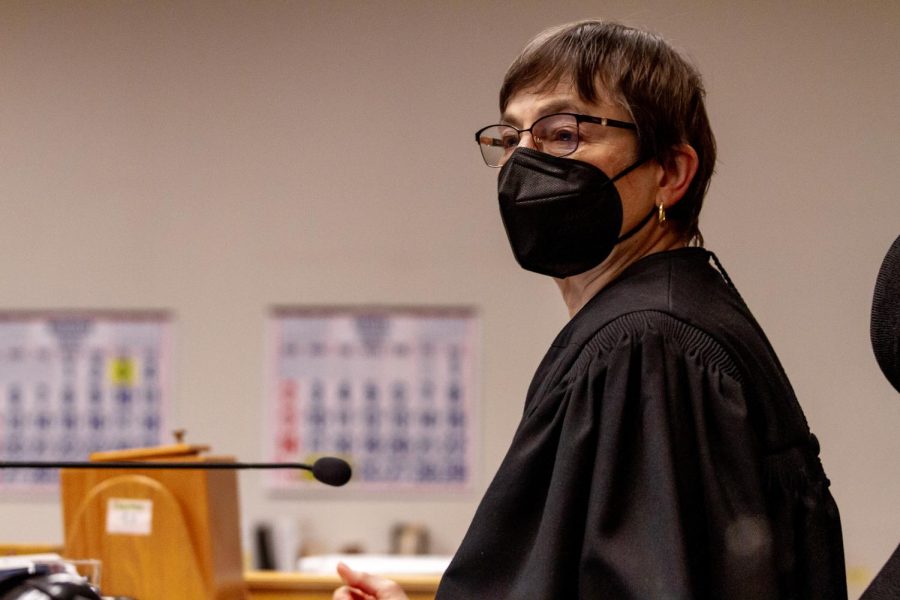NEVAREZ:
For years, the office windows at Seattle Pacific University were full of posters and promotions. But over the summer, that changed when a new policy outlawed any non-approved displays on an exterior window in employee offices. This policy, simply titled “SPU Display Policy,” set new guidelines for staff and faculty to follow when it comes to posting around campus.
As of fall, many posters, signs, and art projects are still on display, including pride flags and symbols signaling queer allyship.
Dr. Kevin Neuhouser is a Professor of Sociology and Co-Chair of the Sociology Department. He is also the faculty advisor for the LGBTQ club, Haven.
He has a pride flag visible from his office in Alexander Hall, which faces the Dravus parking lot and covers more than half of his window. Neuhouser chose to display it because he believes it helps students feel like they belong at SPU. He describes a time when a student expressed gratitude for the flag.
NEUHOUSER:
A student came to my office, and she said that she wanted to thank me for the flag. She drives to campus and she parks in the parking structure behind Alexander, and so when she comes down the hill, she sees the flag in my window. And she said that, that every day that she drove onto campus and saw that flag, she felt welcome.
The pride flag, in my mind, is not about divisiveness or even politics. It’s about communicating to students that everyone is welcome. Given the controversy, though, I felt like I couldn’t assume that people would know that they were welcome, that it had to be overtly demonstrated.
NEVAREZ:
The controversy Neuhouser mentions revolves around SPU’s “Employee Lifestyle Expectation” policy. The policy says employees must refrain from sexual behavior inconsistent with Biblical standards. This includes same-sex sexual activity, meaning SPU has the right to not hire people for full-time positions based on their sexual orientation.
Employees are free to post whatever they’d like on their walls in private offices, even displays protesting the University’s hiring policies. However, SPU can remove these displays when publicly posted without permission. Failure to comply with the display policy may result in the removal of the displays without prior notice.
Dr. Christopher Hanson, Director of Music Education and Orchestral Activities, expresses his concerns regarding the removal of impermissible displays.
HANSON:
My office door is littered with pride flags and affirming statements, and I use my bulletin board to offer the same thing— as I think a ton of faculty do across campus.
But the idea that they would go in and physically remove something from someone’s window…that was a little surprising.
NEVAREZ:
Based on previous experiences, Hanson believes the display policy was made to appeal to those who do not want to see pride symbols on campus. Hanson, who is openly bisexual, believes the policy enacts the erasure of queer community members.
HANSON:
So when you talk about the concept of erasure, this lack of representation, what infuriates me, and of course as a queer person this is how I view it… You don’t want to work with me. You’ve made that clear that you don’t want queer people to be hired as faculty here at SPU.
NEVAREZ:
Dr. Kimberly Sawers is the Vice President for Business and Finance at SPU. She was tasked with the responsibility of informing employees about the display policy.
According to Sawers, conversations surrounding public displays on campus started last year. These conversations resulted in the creation of a committee that would go on to write the display policy.
SAWERS:
So they floated a number of policies, the display policy was only one of them, and it specifically addressed what was okay to display in common areas. So when it came to senior leadership, I started doing my own research. “Well, okay, what does this look like at other universities?” “Where is the policy held in other universities?” “And is this policy fairly consistent with what other institutions have?” Yes, okay. “Was everybody gonna be happy about this policy/” No.
NEVAREZ:
Sawers understands how the policy may alter how employees convey their alliance with the queer community. However, she believes there are still ways for employees to express themselves on campus.
SAWERS:
In any other setting, this policy is rather innocuous. But because of the state that we’re in it, it feels like another loss. And so the question is… “how do we look at this for what it is, and then find ways of expression that communicates what we would like to communicate with the freedom that we have?”
NEVAREZ:
Some employees are already considering ways to show their alliance with the queer community, even with the new display restrictions.
Dr. Lynette Bikos is the department chair of clinical psychology and Associate Dean of research for the School of Psychology, Family, and Community. She explains how the display policy doesn’t prevent employees from presenting symbols or affirming statements on their clothes.
BIKOS:
Certainly, whatever you wear on your body is a symbol, so I know a lot of faculty who wear pride pins or pride colors. I hosted about six weeks of a sew-a-thon last year, and faculty and students and staff and alumni came to my house across a period of about six weeks, and we made a thousand hats and scarves that were ‘love is love.’ And we had some polar fleece fabric with all the LGBTQ symbols— the circles, and triangles.
We thought the policy was going to come out last winter or spring and so we were ready for a protest.
NEVAREZ:
As for what the policy means for future discussions at SPU, some faculty members believe more conversations that include the queer community must be held. Here’s Neuhouser again.
NEUHOUSER:
What we need is more communication and more dialogue and willingness to talk. So the imposition of a policy without consultation doesn’t help. I don’t think it helps me, I don’t think it helps the administration. I think the likelihood is that it will lead to more conflict that will hurt all of us.




















































































Peter Thomson • Oct 2, 2023 at 7:37 pm
This is article would have been much better if it included representation and explanation from those who initiated the SPU Display Policy.